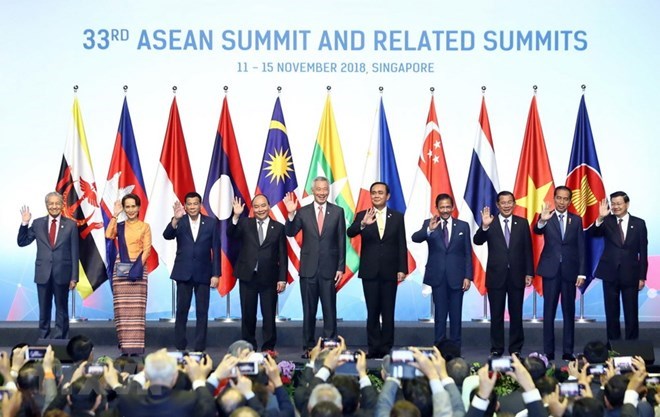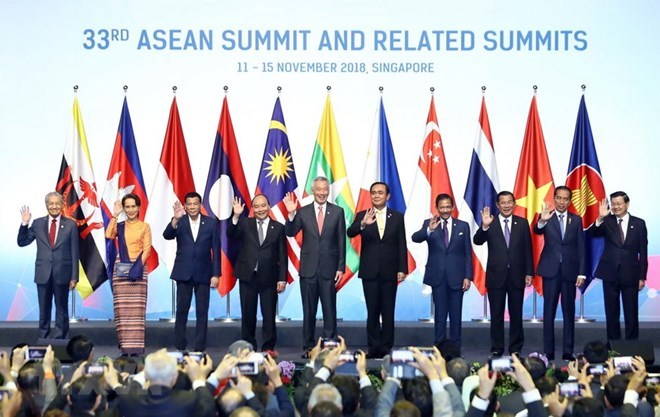



Vietnamese Prime Minister Nguyen Xuan Phuc (fourth, left) and
other ASEAN leaders at the 33rd ASEAN Summit in Singapore last November
(Photo: VNA)
The 33rd ASEAN Summit and related meetings last November concluded
Singapore’s chairmanship.
Ensuring ASEAN’s central role and the region’s dynamic development was
Singapore’s target for the bloc this year.
It put forth three focuses during its chairmanship, namely maintaining the
rule-based regional order to help ASEAN better resolve emerging security
challenges like cyber security, trans-national crime and terrorism; promoting
regional economic integration and connectivity to enhance prosperity and
competitiveness; and finding creative ways in digital technology management and
utilisation, and improving people’s ability to adapt to a digital economy.
Under Singapore’s chairmanship, the bloc has maintained its centrality and consolidated
ASEAN-led dialogue and cooperation mechanisms, attaining major outcomes in
building an ASEAN Community and realising the ASEAN Community Vision 2025,
while contributing to peace and stability in the region.
The procession of community building included a series of initiatives proposed
by Singapore and other member nations. Notably, leaders adopted the ASEAN Smart
Cities Network to connect 26 cities in the region to facilitate access to
achievements generated by the community building.
ASEAN also received strong support from its partners and played its role in
dealing with emerging issues, especially large natural disasters.
Its relations with partners have been enhanced through special summits with
Australia and India.
Aside from those strides, the grouping also faces difficulties and challenges
posed by complex changes in the international and regional environment, as well
as in ASEAN itself.
The changing geo-political balance has turned ASEAN into a "front” for powerful
countries to compete for influence. Additionally, the free, open and rule-based
multilateral system that has contributed to ASEAN’s growth and stability is
under pressure as some countries, including world powers, do not support
multilateralism.
Facing this fact, ASEAN leaders have reiterated the key requirement is
maintaining solidarity, unanimity and the central role of ASEAN and solidifying
an open, transparent and rule-based regional cooperation architecture with
ASEAN at the centre.
Cohesion is considered the "catalyst” assisting the bloc to adapt to the
changing international environment and sustain its central role in the region
in the face of other blocs or regional cooperation projects. It is also an
important factor for ASEAN to be recognised as a valuable partner of powers in
the world.
Cohesion will also help strengthen the Southeast Asian region’s capacity to
cope with common threats like terrorism, cyber-crime and climate change, and
grasp opportunities and respond to unwanted impacts of the digital technology
revolution.
With the efforts and steps taken in 2018, ASEAN has shaped new directions to
move forward and build a steadfast, resilient and cohesive community.
Source: VNA